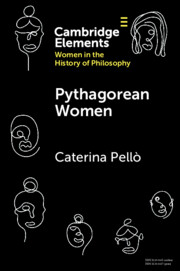Refine search
Actions for selected content:
2 results
Chapter 7 - Pythagorean Women and the Domestic as a Philosophical Topic
-
-
- Book:
- Ancient Women Philosophers
- Published online:
- 17 August 2023
- Print publication:
- 31 August 2023, pp 134-151
-
- Chapter
- Export citation

Pythagorean Women
-
- Published online:
- 07 July 2022
- Print publication:
- 28 July 2022
-
- Element
- Export citation
